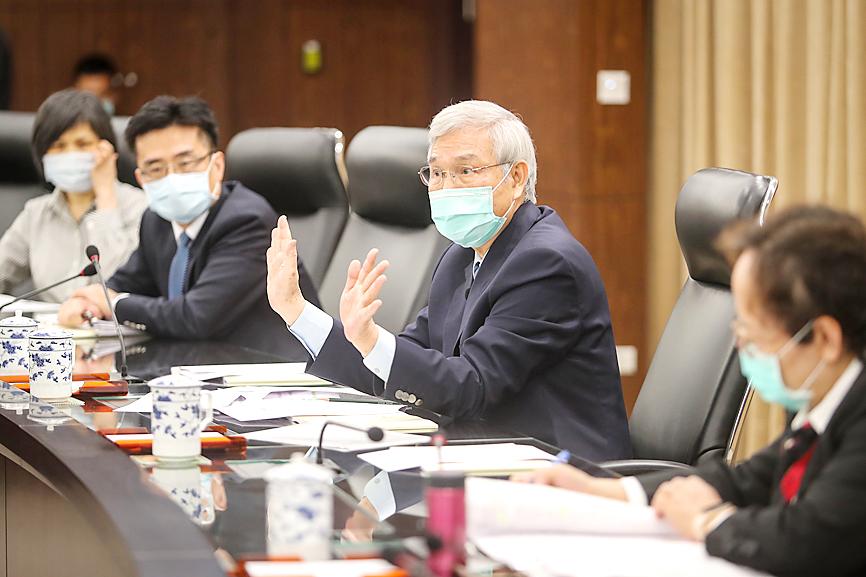The central bank on Thursday acknowledged in the clearest terms to date that it is intervening in foreign-exchange markets, using the word that it had studiously avoided and vehemently protested until now.
Regular late-session moves by state-backed banks to pare gains by the New Taiwan dollar against the US dollar are “a kind of intervention,” central bank Governor Yang Chin-long (楊金龍) told reporters after announcing its decision to maintain record-low interest rates.
He used the English word “intervention” in his otherwise all-Mandarin response to a reporter’s question. Previously, Yang had referred to such actions as “smoothing.”

Photo: CNA
Daily efforts to stabilize the NT dollar began in earnest in June last year, holding at about NT$29.50 against the US dollar until September last year.
Since then, it appears that the bank has been managing the currency’s appreciation, with intraday trading crossing the NT$28 line during most sessions this year, before retreating at close.
Trading has been more erratic in the past two weeks — the currency weakened to NT$28.47 to the greenback at 11:56am yesterday, after closing at NT$28.31 on Thursday.
Since taking the reins as governor in early 2018, Yang has gradually brought a more relaxed and candid tone to the monetary authority’s news conferences.
In March last year, the central bank started releasing more information on its foreign-exchange swap trading, a rare move aimed at answering calls for greater transparency.
His remarks came after the US Department of the Treasury in December last year added Taiwan to its currency manipulator watch list.
Last week, Yang said that the US might designate Taiwan a currency manipulator, but that there would not be much negative impact on the local economy, given robust US demand for semiconductors.
Semiconductors were the main factor driving Taiwan’s trade surplus with the US, he said.
“If they want to reduce our trade surplus with them, then we could just stop selling them our chips,” he joked to lawmakers on Thursday last week. “But they need them.”

Taiwan’s rapidly aging population is fueling a sharp increase in homes occupied solely by elderly people, a trend that is reshaping the nation’s housing market and social fabric, real-estate brokers said yesterday. About 850,000 residences were occupied by elderly people in the first quarter, including 655,000 that housed only one resident, the Ministry of the Interior said. The figures have nearly doubled from a decade earlier, Great Home Realty Co (大家房屋) said, as people aged 65 and older now make up 20.8 percent of the population. “The so-called silver tsunami represents more than just a demographic shift — it could fundamentally redefine the

The US government on Wednesday sanctioned more than two dozen companies in China, Turkey and the United Arab Emirates, including offshoots of a US chip firm, accusing the businesses of providing illicit support to Iran’s military or proxies. The US Department of Commerce included two subsidiaries of US-based chip distributor Arrow Electronics Inc (艾睿電子) on its so-called entity list published on the federal register for facilitating purchases by Iran’s proxies of US tech. Arrow spokesman John Hourigan said that the subsidiaries have been operating in full compliance with US export control regulations and his company is discussing with the US Bureau of

Businesses across the global semiconductor supply chain are bracing themselves for disruptions from an escalating trade war, after China imposed curbs on rare earth mineral exports and the US responded with additional tariffs and restrictions on software sales to the Asian nation. China’s restrictions, the most targeted move yet to limit supplies of rare earth materials, represent the first major attempt by Beijing to exercise long-arm jurisdiction over foreign companies to target the semiconductor industry, threatening to stall the chips powering the artificial intelligence (AI) boom. They prompted US President Donald Trump on Friday to announce that he would impose an additional

Pegatron Corp (和碩), a key assembler of Apple Inc’s iPhones, on Thursday reported a 12.3 percent year-on-year decline in revenue for last quarter to NT$257.86 billion (US$8.44 billion), but it expects revenue to improve in the second half on traditional holiday demand. The fourth quarter is usually the peak season for its communications products, a company official said on condition of anonymity. As Apple released its new iPhone 17 series early last month, sales in the communications segment rose sequentially last month, the official said. Shipments to Apple have been stable and in line with earlier expectations, they said. Pegatron shipped 2.4 million notebook